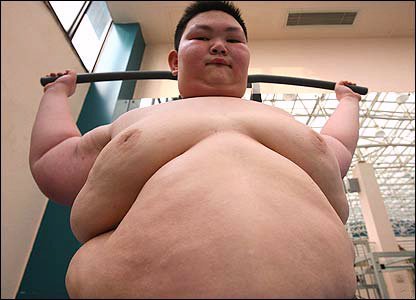| Obesity in China Skyrocketing
The Health eZine - Weight Issues
Widening Waistlines in ChinaMarch 2008. Things are changing in China, and it is not the Olympics. Internet usage is soaring, people aren't exercising as much as they used to, they are eating more fatty foods and junk food... and their obesity rate has doubled from 3.6% to 7.1% in the last 15 years and the percentage of Chinese people who are overweight has gone up to 22.8%. Approx. 296 million Chinese (almost the population of the USA) are now overweight. Since 1992 China's obesity has climbed 97% and the overall prevalence of people who are overweight has climbed 39%. Vice Health Minister Wang Longde warns the problem would get worse and that the government would work with global health organizations to improve nutritional intake and reduce the rate of chronic obesity-related diseases.
The results of the 2002 survey were not revealed until this year because of the time it took to tabulate results due to the large number of people surveyed, more than 270,000, and the large number of counties involved. The study showed that as the world's most populous country had made progress in reducing poverty in the past few decades, its people were now facing new health issues, arising largely from an increasingly fatty diet. "The Chinese population does not have enough awareness and lacks knowledge of what is reasonable nutrition and diet," Wang said.
Hypertension rates among adults had reached 18.8 percent, increasing by 31 percent or 70 million cases since 1991 with 160 million people suffering from high blood pressure, the study found, adding that public lacked awareness of the need to seek medical treatment More than 20 million people were also suffering from diabetes, which affected 2.6 percent of the population, according to the study.
Compared with the information collected in a 1996 survey, the prevalence of diabetes among adults over the age of 20 in big cities has increased from 4.6 percent to 6.4 percent. Some Chinese people were consuming an excessive amount of meat, oils and fats and not enough cereal, especially urban residents. Insufficient intake of calcium, iron, vitamin A as well as other nutrients was also a common problem in both urban and rural areas.
With steady economic growth in the past two decades, however, China's people had more protein intake, especially meat, eggs and poultry, and the prevalence of malnutrition and nutrition deficiencies had dropped, the study found. At the same time however fast food restaurants, junk food and processed food is skyrocketing in popularity. Chinese people are also exercising less and sitting down more often in front of television or the internet. China now has the 2nd largest number of internet users behind the United States.

|



|




